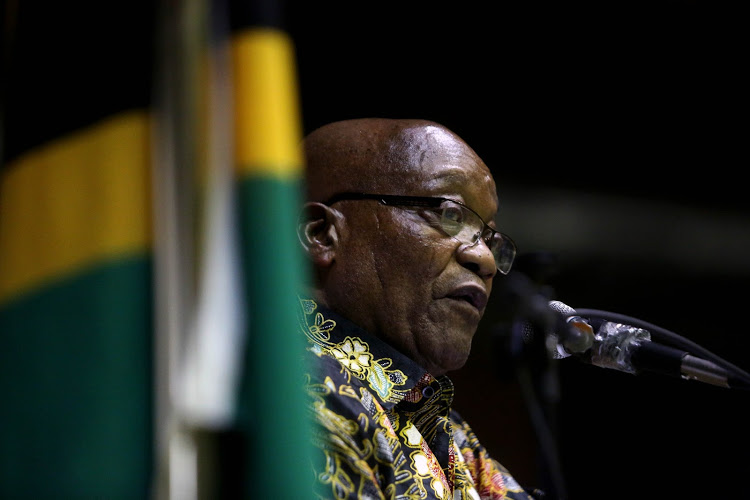Zuma Is Sucking Out Both Malema And Ramaphosa
Analysis: Could Jacob Zuma’s MKP End Julius Malema’s EFF and Cyril Ramaphosa’s ANC?
By Dorrothy Moyo | As South Africa grapples with shifting political allegiances and economic instability, Jacob Zuma’s Umkhonto WeSizwe Party (MKP) has emerged as a disruptive force that could significantly alter the country’s political landscape. Zuma’s recent rally marking the MKP’s first anniversary, alongside Julius Malema’s incendiary comments in the Financial Times, signals a political showdown that could destabilize both the Economic Freedom Fighters (EFF) and the African National Congress (ANC).
Zuma’s Growing Influence
Zuma’s MKP, founded in 2023, has swiftly established itself as a formidable player in South African politics. Positioned as a party of “total liberation,” its platform emphasizes land redistribution, state-led economic transformation, and decolonized education. With its populist rhetoric and critiques of the ANC’s centrist policies, the MKP has attracted disillusioned ANC members and prominent defectors from the EFF, such as Floyd Shivambu and Dali Mpofu.
Shivambu recently described the MKP as a “superior alternative” to the EFF, which he criticized as a “small, unviable fiefdom.” His statement suggests that Zuma’s leadership is resonating with factions of the radical left who view Malema’s EFF as ineffective or overly centralized.
Malema’s Dismissal of Zuma
Malema, however, remains defiant. In an interview with the Financial Times, he rejected any possibility of uniting with the MKP, despite their shared goals of expropriating land without compensation and nationalizing mines and banks.
“To work with President Zuma is to stab yourself in the back because he’s not honest,” Malema said, accusing Zuma of using political allies only to discard them later. His remarks, which included vulgar and personal attacks, underscored deep animosity between the two leaders.
Malema also implied that defectors like Shivambu and Mpofu were attempting to “assassinate” the EFF by leaving the party. This rhetoric reflects the strain that the MKP’s rise has placed on Malema’s party, as internal divisions threaten its cohesion.
The ANC’s Decline
Meanwhile, the ANC under President Cyril Ramaphosa is grappling with its own crisis. Its share of the vote has plummeted to below 40%, forcing the once-dominant party into coalitions with opposition groups like the Democratic Alliance. Ramaphosa’s centrist policies and focus on economic stability have alienated factions within the party and the broader electorate.
Zuma’s criticism of the ANC’s failure to fulfill the promises of 1994—particularly on land reform and economic transformation—has struck a chord with many South Africans who feel left behind. By positioning the MKP as a revolutionary alternative, Zuma is challenging both the ANC’s centrist policies and the EFF’s claim to radical politics.
A Threat to Both the ANC and EFF?
Zuma’s MKP has the potential to disrupt South Africa’s political equilibrium in several ways:
- Weakening the ANC: By appealing to disenchanted ANC members, the MKP could siphon off support from the ruling party, particularly in rural and working-class areas where land reform and traditional leadership remain pivotal issues.
- Dividing the Radical Opposition: The MKP is already pulling high-profile defectors from the EFF, challenging Malema’s authority and fragmenting the radical left. If this trend continues, the EFF’s electoral base could shrink significantly.
- Positioning for 2024: With national elections looming in 2024, the MKP’s rapid growth suggests it could emerge as a kingmaker, particularly if no party secures an outright majority.
Zuma’s Legacy and the Road Ahead
Despite Malema’s assertion that Zuma cannot be trusted, the former president’s enduring influence cannot be dismissed. His ability to galvanize discontented factions within the ANC and EFF positions him as a critical player in South Africa’s evolving political landscape.
The rivalry between Zuma, Malema, and Ramaphosa reflects deeper fractures within South Africa’s political system. As the MKP gains momentum, the question remains: can Zuma translate his populist appeal into lasting political dominance, or will internal divisions and his controversial past hinder the MKP’s rise?
What is certain is that Zuma’s re-entry into frontline politics has already shaken South Africa’s political order. If his MKP continues to grow, it could spell the end for both the ANC as a dominant party and Malema’s EFF as the voice of radical opposition.
Related
#Zuma #Sucking #Malema #Ramaphosa #ZimEye



